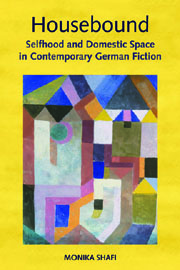Book contents
- Frontmatter
- Contents
- Acknowledgments
- List of Abbreviations
- Introduction
- 1 Bodies, Biographies, and Buildings: Jenny Erpenbeck's Heimsuchung and Katharina Hacker's Der Bademeister
- 2 House Inheritance: Arno Geiger's Esgeht uns gut and Katharina Hagena' Der Geschmack von Apfelkernen
- 3 Escaping to the Countryside: Walter Kappacher's Selina oder Das andere Leben and Monika Maron's Endmoränen
- 4 Uncanny Houses: Select Narratives by Judith Hermann, and Susanne Fischer's Die Platzanweiserin
- 5 Open Houses: Emine Sevgi Özdamar's “Der Hof im Spiegel” and Seltsame Sterne starren zur Erde: Wedding-Pankow 1976/77
- 6 (Un)safe Houses: Katharina Hacker's Die Habenichtse and Ian McEwan's Saturday
- Conclusion
- Bibliography
- Index
5 - Open Houses: Emine Sevgi Özdamar's “Der Hof im Spiegel” and Seltsame Sterne starren zur Erde: Wedding-Pankow 1976/77
Published online by Cambridge University Press: 05 February 2013
- Frontmatter
- Contents
- Acknowledgments
- List of Abbreviations
- Introduction
- 1 Bodies, Biographies, and Buildings: Jenny Erpenbeck's Heimsuchung and Katharina Hacker's Der Bademeister
- 2 House Inheritance: Arno Geiger's Esgeht uns gut and Katharina Hagena' Der Geschmack von Apfelkernen
- 3 Escaping to the Countryside: Walter Kappacher's Selina oder Das andere Leben and Monika Maron's Endmoränen
- 4 Uncanny Houses: Select Narratives by Judith Hermann, and Susanne Fischer's Die Platzanweiserin
- 5 Open Houses: Emine Sevgi Özdamar's “Der Hof im Spiegel” and Seltsame Sterne starren zur Erde: Wedding-Pankow 1976/77
- 6 (Un)safe Houses: Katharina Hacker's Die Habenichtse and Ian McEwan's Saturday
- Conclusion
- Bibliography
- Index
Summary
In her text “Die neuen Friedhöfe in Deutschland” (1999, The new cemeteries in Germany), a short piece addressing the German national debate about dual citizenship, Emine Evgi Özdamar, one of the foremost contemporary Turkish-German authors, takes issue with the concept of fixed national identities as symbolized in passports. Her witticisms, such as the idea of nineteen passports for everyone, illustrate that allegiances are always multiple, shifting, and historically dependent. She concedes, however, that nineteen passports may be a bit too complicated. After all, wouldn't they require in-depth expertise in current affairs and world history? For without such knowledge, how is one to grasp which of the nineteen to present at any given border without stirring old or new resentments? Rejecting her own idea, she asks Nihal, a cleaning lady and mother of two, about her views on dual citizenship; Nihal tells her:
Ich werde auch den deutschen Paß beantragen, wenn es möglich ist, wegen meiner Kinder. Sie sind hier geboren. Aber wir sind alle nur Gast auf dieser Welt, keiner von uns wird in dieser Welt bleiben, wir werden alle gehen. Alle sind Fremde in dieser Welt, letztendlich. Ein Paß für alle ist am besten. Der Weltpaß.
[I will also apply for the German passport, if possible, because of my children. They were born here. But we are all just guests on this world, no one will stay in this world, we will all leave. After all, everyone is a stranger in this world. One passport for everyone would be the best — a world passport.]
- Type
- Chapter
- Information
- HouseboundSelfhood and Domestic Space in Contemporary German Fiction, pp. 140 - 168Publisher: Boydell & BrewerPrint publication year: 2012

